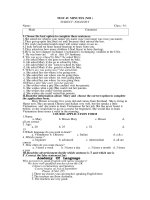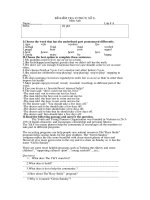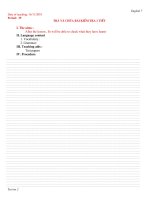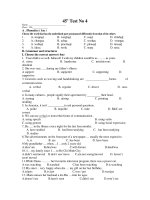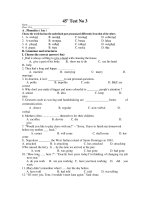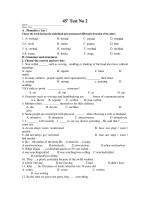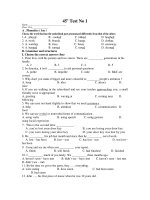45’ Test No 2 pps
Bạn đang xem bản rút gọn của tài liệu. Xem và tải ngay bản đầy đủ của tài liệu tại đây (18.6 KB, 3 trang )
45’ Test No 2
Name__________________________________
Class: 12A______________
A . Phonetics ( 1m )
Choose the word that has the underlined part pronounced differently from that of the others
1. A. worked B. forced C. caused D. stopped
2.A. roofs B. chairs C. grapes D. hats
3. A. cooked B. watched C. washed D. decided
4.A. wants B. books C. stops D. sends
B. Grammar and structures
I. Choose the correct answer( 4m)
1. Non verbal ______ such as waving , nodding or shaking of the head also have cultural
meanings .
A. signs B. signals C. hints D.
marks
2. In many cultures , people signify their agreement by _________ their head .
A. turning B. raising c. pointing D.
nodding
3.It's rude to point ____________ someone!
A
. on
B
. out
C
. at
D
. up
4. Gestures such as waving and handshaking are forms of communication.
A
a. direct'
B
. regular
C
. verbal
D
. non-verbal
5. Mothers often themselves for their children.
A. die B. devote C. sacrifice D.
give.
6. Some people are concerned with physical when choosing a wife or husband.
A. attractive B. attraction C. attractiveness D. attractively
7. I _______ well recently . I _____ to see my doctor yesterday . He said that I _____
some rest .
A. do not sleep / went / would need B. have not slept / went /
needed
C. did not sleep / go / will need D. had not slept / went /
had needed
8. He… the author of the book.He….it when he… twenty.
A.was/wrote/was B.is/writes/is C.is/wrote/was D.is/has written/was
9. While Diana …. a volleyball match on TV, her friend….
A.was watching/called B.was watching/was calling C.watched/called
D.watched/was calling
10. They ….a picnic yesterday because of the awful weather.
A.weren’t having B.isn’t having C.had D.didn’t have
11. John … his first piece of music when he was 10 years old.
A. writes B. wrote C. written
D. was writing
12. By the time we got to the party, they … everything.
A. were eating B. have eaten C. had been eaten
D. had eaten
13.The mother asked her son _______.
A. where he has been B. where he had been C. where has he been
D. where had he been
14. She asked me _______ my holidays _______.
A. where I spent / the previous year B. where I had spent / the previous
year
C. where I spent / last year D. where did I spend / last year
15. Robert said that his father _______ to Dallas the year before.
A. goes B. went C. has gone D. had gone
16. She told the boys _______ on the grass.
A. do not play B. did not play C. not playing D. not to play
II . Choose the underlined part need correcting ( 1m)
.17 She asked if I can make an appointment.
A B C D
18. They asked us to not talk about the matter any more .
A B C D
19.I have been in Mexico during the summer of 1970
A B C D
20. Steve wakes up early every morning because he went to work early.
A B C D
C. reading ( 1m)
In the past, both men and women were expected to be married at quite young ages.
Marriages were generally arranged by parents and family, with their children having little
chance to say no in the matter. In the past it was not surprising to find that a bride and
groom had only just met on the day of their engagement or marriage.
In modern Vietnam, this has changed completely as people choose their own
marriage-partners based on love, and in consideration primarily to their own needs and
wants. Moreover early marriage is quite illegal.
The traditional Vietnamese wedding is one of the most important of traditional
Vietnamese occasions. Regardless of westernization, many of the age-old customs
practiced in a traditional Vietnamese wedding continue to be celebrated by both
Vietnamese in Vietnam and overseas, often combining both western and eastern
elements. Besides the wedding ceremony, there is also an engagement ceremony which
takes place usually half a year or so before the wedding. Due to the spiritual nature of the
occasion, the date and time of the marriage ceremony are decided in advance by a fortune
teller. The traditional Vietnamese wedding consists of an extensive array of ceremonies:
the first is the ceremony to ask permission to receive the bride, the second is the
procession to receive the bride (along with the ancestor ceremony at her house), the third
is to bring the bride to the groom's house for another ancestor ceremony and to welcome
her into the family, then the last is a wedding banquet. The number of guests in
attendance at these banquets is huge, usually in the hundreds. Several special dishes are
served. Guests are expected to bring gifts, often money, which the groom and bride at one
point in the banquet will go from table to table collecting.
1. In the past, _________.
A. Vietnamese couples were free to make a decision on the marriage
B. Vietnamese marriage was decided by parents and family
C. getting married at an early age was not allowed
D. parents had no right to interfere their children's marriage
2. In former days, the fact that a bride and groom had only first met just on the day of
their engagement or marriage was _________.
A. surprising B. popular C. uncommon D. strange
3. Which sentence is referred Vietnamese modern marriage?
A. Most young people do not have their marriage based on love.
B. All marriages are arranged by parents and family.
C. Marriage is quite westernization.
D. Couples do not get married at quite young ages.
4. According to the passage, __________.
A. Oversea Vietnamese people do not like to organize a traditional wedding
B. There is an engagement ceremony which takes place usually half a year or so
before the wedding
C. Many of the age-old customs practiced in a traditional Vietnamese wedding do not
exist nowadays
D. Vietnamese people never ask a fortune teller the date and time of the marriage
ceremony
D.(3m) I. Put the verb in bracket into the correct form
1. When I was a girl I (walk) five miles to school every day.
2. He (arrive) late several times.
3. Who (write) the graffiti on the wall yesterday?
4. When I was young , I ( want) to be a bus diver.
5. They (practice) their music lesson at 7 o'clock last night.
6. The kids (sleep) when the bell rang.
II. Report the following sentences
1. “ I’m sorry that I broke the glass,” said Peter.
“ You stole the jewels” the inspector said to him.
3. “ Can you speak English ?” Mr. Brown asked .

